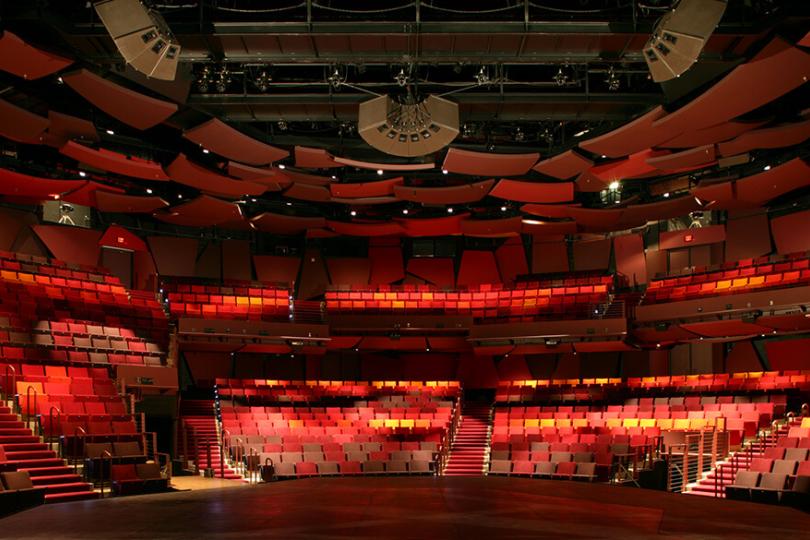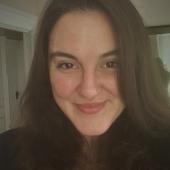“Flesh that needs to be loved”—Toni Morrison, "Beloved"

Lovingly moderated by H. Adam Harris with house music by Kiss the Tiger, the Guthrie Theater’s “Happening: The Art of Surviving” was an excellent example of a large stage (metaphorically and literally) being used well. The Guthrie’s Happening Series is loosely defined as: “are free, periodic events prompted by current headlines, social issues or themes being explored on our stages” (https://www.guthrietheater.org/shows-and-tickets/happenings/, accessed 8/19/2019).
Monday evening, the Guthrie invited four speakers to give reflections on the Art of Surviving: Saymoukda Duangphouxay Vongsay (a Lao American writer, poet, and cultural producer), Sharon Day (the Ojibwe executive director and co-founder of the Indigenous Peoples Task Force), Ifrah Mansour (a Somali, refugee, Muslim multimedia artist and educator), and Laura Stearns (an active member of the Twin Cities theater community and sexual assault survivor). While their specific stories and method of address varied, the speakers brought a similar radical persistence and life-affirming love for their communities and themselves. It was overwhelming and humbling to be in the presence of such an outspoken and compassionate group of women, and H. Adam Harris’ facilitation was equally warm and considerate. Harris encouraged us to be in the moment and to selectively report out afterwards, understanding that some things are for a particular moment in time for a particular audience and are not meant to be more widely shared. I have tried to take this excellent and kind advice to heart in the account below.
Vongsay started out the evening with “small packages of stories” and poetry. A Laos refugee, she does not want Laos stories to fall prey to cultural ventriloquism, and so she does not have the luxury not to tell these stories and they are also her privilege to tell. A self-described motherland orphan, her poetry selection moved between family stories and personal remembrances of her mother—her poetry is achingly visceral and deeply moving.
Day’s approach straddled the line between highly personal memoir and cold, upsetting facts. Day recounted several stories about her placement with an abusive foster care family, interspersed with statistics such as Indigenous children in Minnesota are 17% more likely to be placed in foster care and 23.9% of all children in foster care are Native children, despite being only 1.4% of the population. When her mother finally got her children back, authorities made it clear to her that if she ever needed public assistance again the children would be taken permanently. It’s hard to hear stories such as Day’s and not think about both the Trump administration’s boarder separations as well as their recent embrace of “public charge” rules which aim to punish and deter migrants who need access to social assistance.
Mansour’s presentation was also highly poetic and looked at how refugees shoulder and challenge our common notions of humanity. Mansour has a moving voice, and she challenged audience members to, “spice the future.” Mansour’s poems covered Somali tea, Ilhan Omar, and her childhood remembrances of war. For each different poem, she wrapped and re-wrapped her hijab, calling attention to it as well as showcasing its malleability. It was a physical instantiation of the potential change all four speakers called for.
Stearns’ presentation, which included her legal battle with the Children’s Theater Company, was the acknowledged impetus for this happening, but certainly not its only focus. Along with moving through the 3 “A”s (Acknowledgement, Acceptance, and Action), her presentation seemed centered on Action. She implored all of us to move forward in the face of fear, and that we have not only the opportunity but an obligation to create profound local, national, and international cultural shifts.
The evening finished up with small breakout sessions facilitated by a range of people who work with trauma, community, and activism. I applaud the Guthrie for making this experience available to the public, but I do wish that the breakout session was a bit longer. I felt like I learned so much from the members of my group; we had only just started to get comfortable with one another and into the meat of our conversation when time was called. My only complaint with these groups is that there didn’t seem to be anyone trained to discuss the Indigenous experience and very few who could speak to refugee trauma, which seemed at odds with so many of the speakers focusing on these stories.
I went in unsure. As so many of us in the audience shared, I have been the victim of sexual misconduct and coercion, and I was unsure if this type of event could really promote healing and community. It did, and I think it (and others like it) have potential to do so. As Stearns advised the audience, we have to make room to be messy in this process of accountability and healing – we have to be able to mess up and to ask forgiveness of our own and others' attempts. And then we have to do it again. I hope that this wasn’t a one-off for the Guthrie and that they continue to work with the community to create such moments again.




